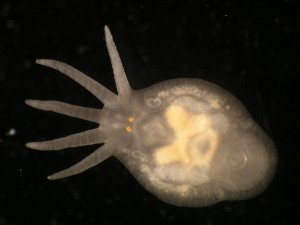SATURDAY, 28 MAY 2016

We’ve all heard about extinction – species lost forever but what happens when another species is entirely dependant on the one that is lost? Co-extinction, that’s what. On the flip side, now that we know what’s at stake, concerted efforts to secure the crayfish’s future will also ensure one for the tentacle flatworm. This is my kind of 2 for 1 offer.

Image & video: David Blair/James Cook University
Written by Michelle Cooper
